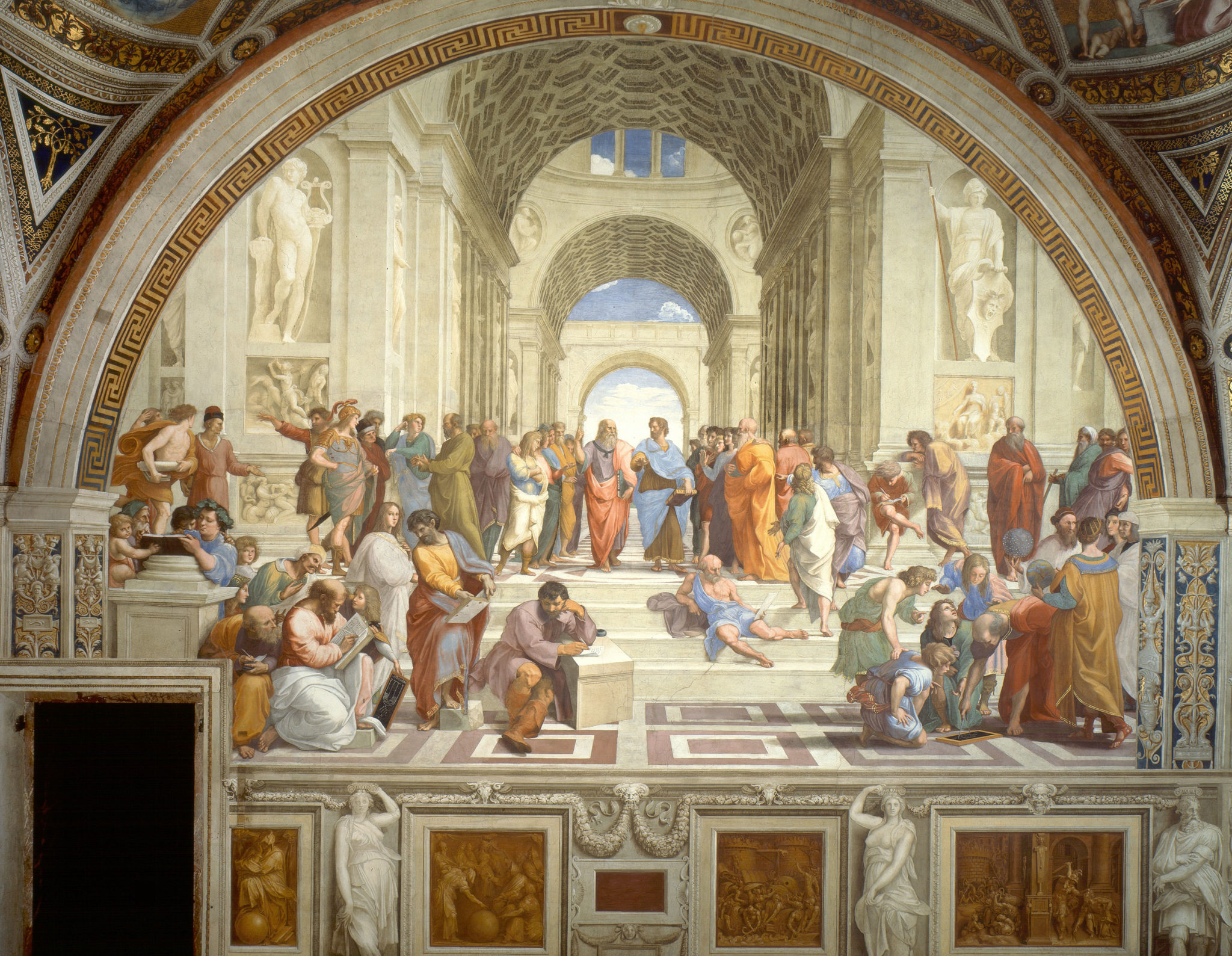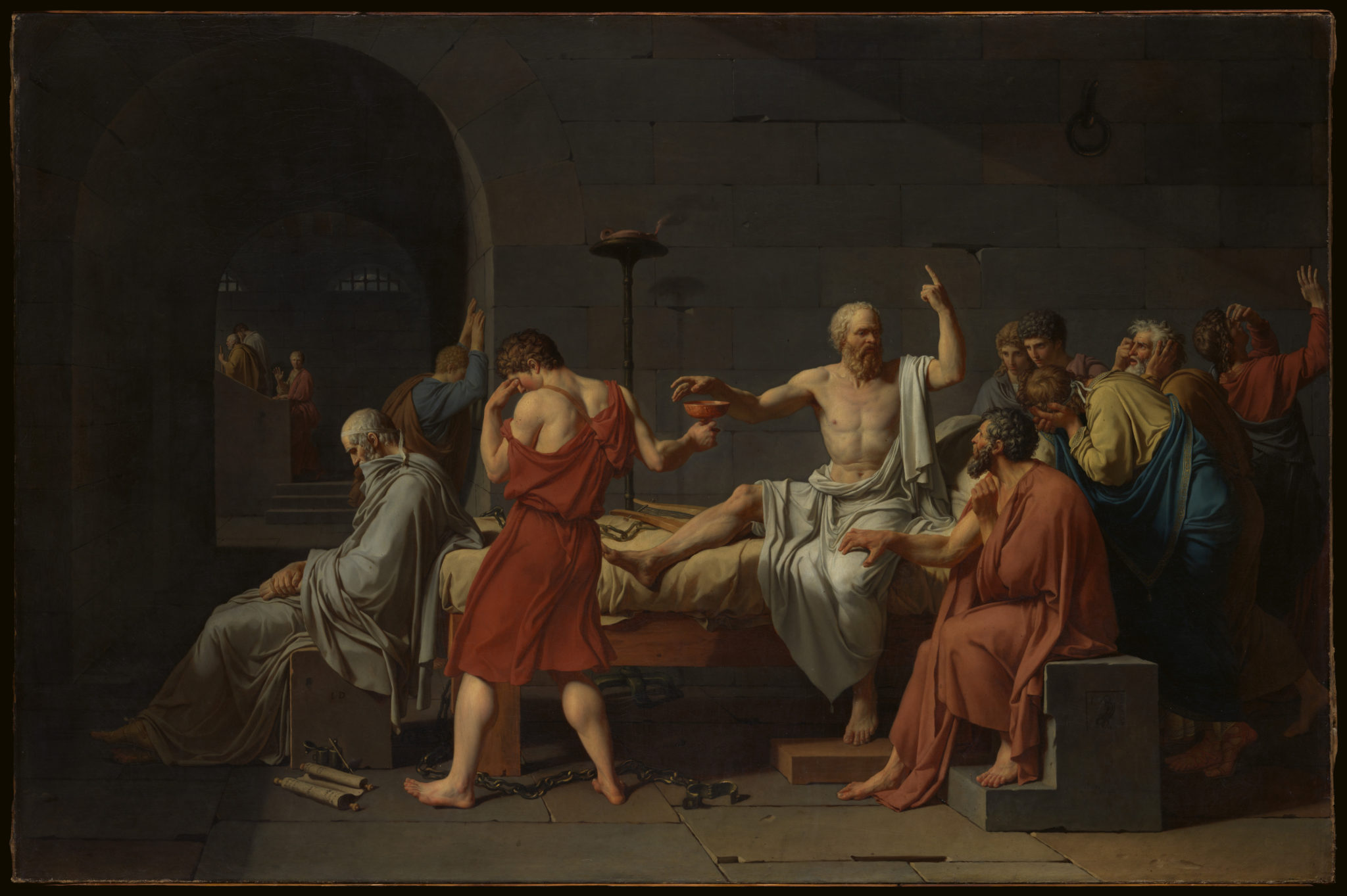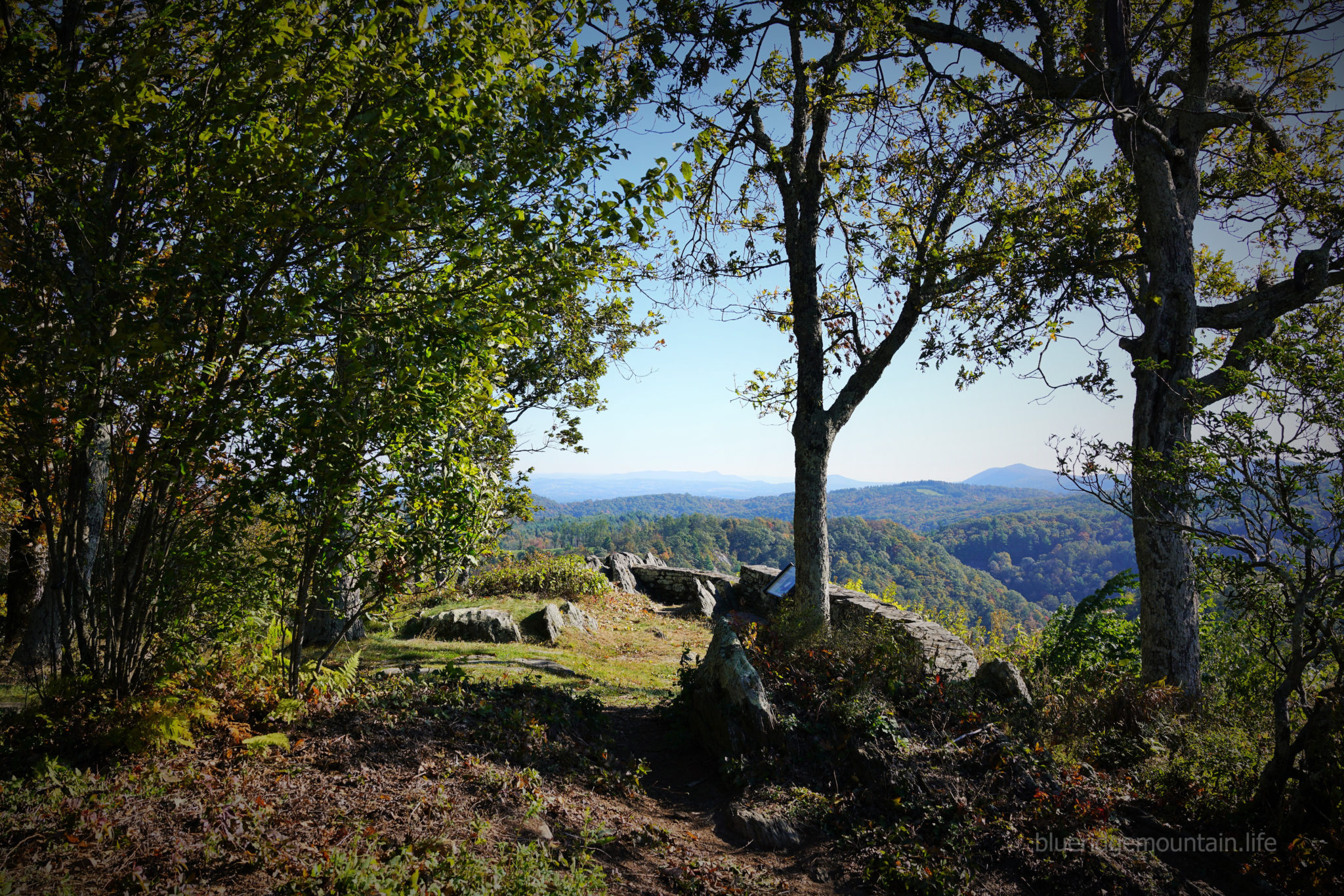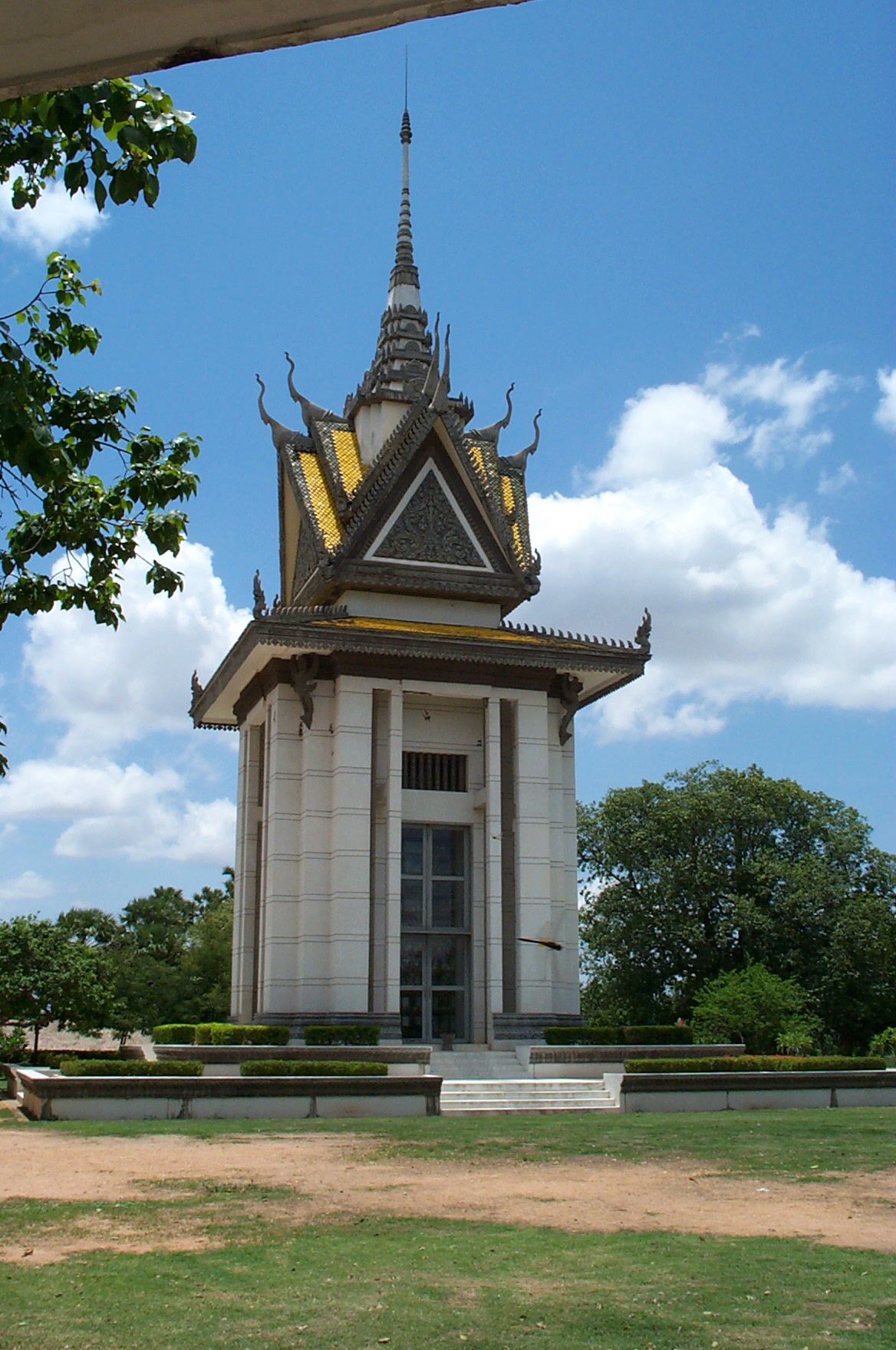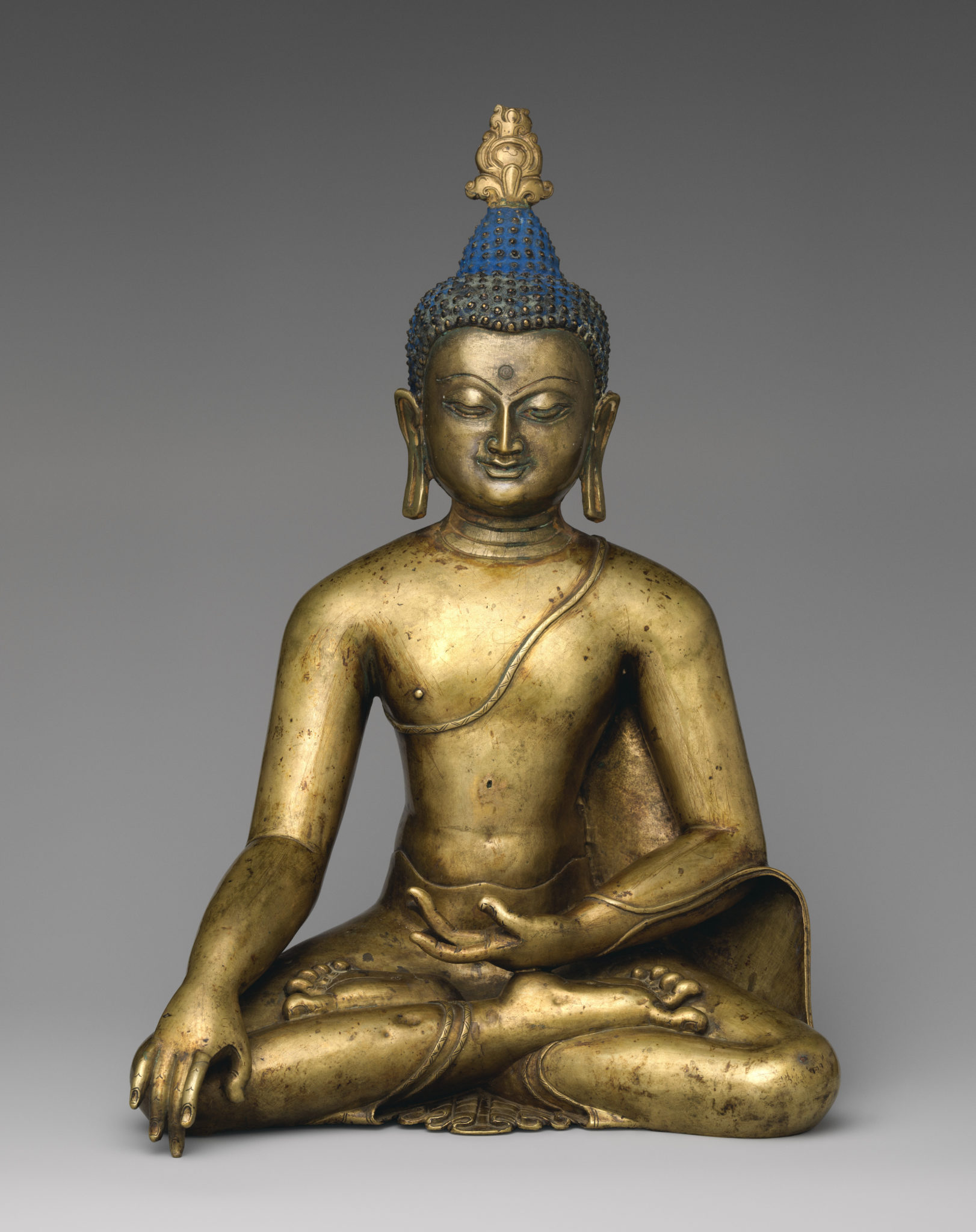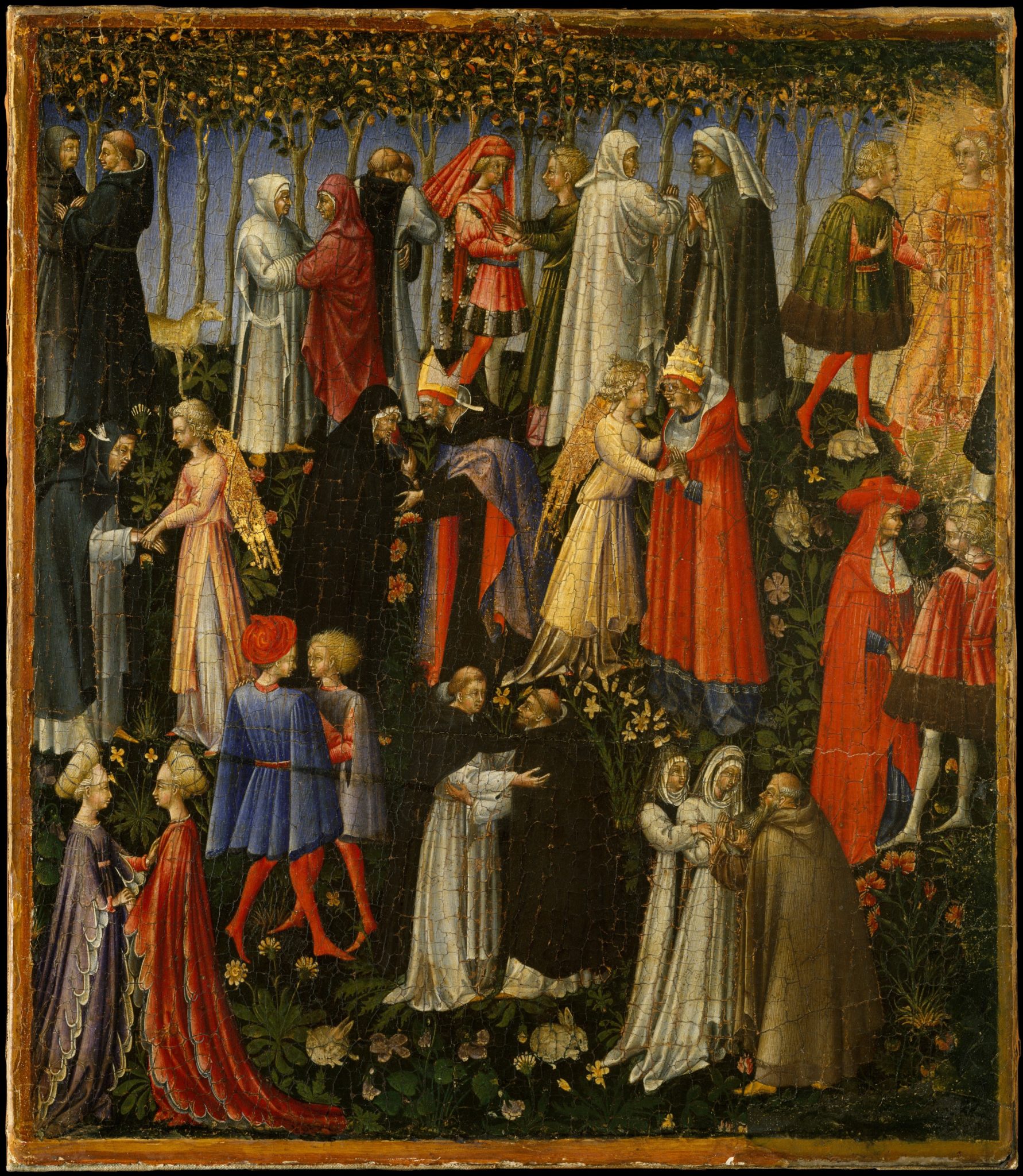My wife was the most capable woman I’ve ever known. Beautiful, kind, and very smart. For many years she was an accomplished Data Analyst at IBM as part of their technical sales team. A divorcée when we met over a decade ago, her primary job then was to love, guide and protect her two teenage daughters. At her secondary job, she would often walk into a room full of men, say at Bank of America, or Progress Energy, and with technical expertise and an easy manner make good the promises of IBM.
During Visitation at the funeral home some of her colleagues came by to pay their respects and offer condolences. One guy did so by telling me how much he enjoyed working with Susan, and how he knew things would get better once Susan entered the room. I beamed in my typically toothy way and said, “that sounds exactly like my wife.” Then we hugged, grateful for having shared life with an exceptional woman.1Plus she loved football! Can I pick em or what?
***
I have a granddaughter now that I adore. I have stepdaughters, sisters, nieces, grandnieces and other female relatives and friends that I cherish. And now the reason for this post and title. I don’t want the women I love ignored or their capabilities doubted because they’ve checked “F” in the gender box. I don’t want them to experience the ‘wisdom’ attributed to Socrates by Plato when “he told the women to go away.”
God doesn’t either. God made us for each other and together for the world.
You can read Socrates’ comment about female ‘weakness’ at the end of my previous post. I know he was principally referring to what he perceived as the female inability to cope with death, so I don’t want to be uncharitable to the brave Socrates here, but we know his view of female ‘weakness’ went deeper than that. Athenian male attitudes about the opposite sex were, shall we say, unenlightened.2A saying ascribed to Socrates records him giving thanks that he was born a human and not a beast, a man and not a woman, a Greek and not a barbarian (Diog. Laert. 1:33)
Women were not as rational as men could be, or so Socrates thought. He sent the women away so they wouldn’t act ‘absurdly’ when death arrived. From his ‘exalted’ vantage point, earthy female ‘irrationality’ would diminish his moment of sweet release into the presence of the gods. As he saw it, his soul was about to be liberated from the incarceration of his body. And the women in his life wouldn’t understand. Unlike the men in the room who had been ‘sitting at the feet’ of the wise Socrates, men who had been taught the body was ultimately unimportant and that only the liberated soul mattered, Athenian women had not learned this ‘wisdom.’ So he told them to leave. They had not yet learned that bodily life is something we should want to escape. Those women were too much like Jill in my last post.
We’ve come a long way since Plato’s day in the city of Athens.3We only know Socrates through the writings of his pupil Plato. I say we, because all thinking males now understand the indispensable intelligence, wisdom, work and beauty the ladies bring to our world. And yet we all realize more work needs to be done before wholeness returns to God’s good creation. But, like Socrates, males and, ironically, females have often colluded with death in its war against human nature, it’s war against God’s whole, good creation. Which amounts to having told our women and more broadly our bodies & the earth from which they came to go away.
***
If you’ve read my previous posts you know I believe the world created by God is bi-natured. I believe creation consists of Heaven and Earth. Spirit and Matter. Soul and Body. Male and Female. And those natures were meant to be complimentary, married. And equal. Co-mingled. Yet distinct. Expressing Unity with Plurality. Overlapping and interlocking. From the beginning, that is the Big Picture definition of wholeness, a union out of which creational life flows. For the God of Life, our Creator, made us in His image and according to His likeness. And that God made us creators of Life.
But our world is broken now. Out of joint. Including us. What happened? And how may it be repaired?
I know self-help gurus fill our bookstores to tell us how wonderful we are, we just have to believe we are wonderful and that will make it so. Of course it is true, we are amazing, gifted creatures. And the world around us is wonderfully made. I’ve looked out the window. I’ve seen the lush meadow. Heard the lark. Watched the players play. The dancers dip and twirl. I’ve observed the many human kindnesses and accomplishments.
Truly the world is charged with the grandeur of God, as Hopkins said.

***
Except…when we are not.
At those times when we are disconnected from our source of life, when our store of energy depletes, when we live untruthfully, untrothfully, unbetrothed, that world is angry, selfish, harmful, foolish and ugly. That world is dying.
Humans are both the glory and problem of earthly creation.4Other non-human beings contribute to the world’s brokenness too. 2 Corinthians 4:4 (NRSV): “the god of this world has blinded the minds of the unbelievers, to keep them from seeing the light of the gospel of the glory of Christ, who is the image of God.” In John 12:31 Jesus referring to Satan says: “now the ruler of this world will be driven out.”
So where do we go from here? How is the breach re-paired? The ancient wisdom of Christianity says we start by acknowledging our fully integrated unbroken Creator. Because, according to that wisdom, we become like what we worship. The reason? Worship, ascribing worth, invites transforming presence. Also the breach is re-paired by acknowledging the Truth, the Trothfulness, and the sacred worth, of God’s bi-natured world. And God’s intention of harmonic coexistence, God’s intention to re-marry that bi-natured world. It is the opposite of alienation, or unhealthy separation (some separation is good). Reconciliation becomes our watchword as we move forward. Which, of course means, we never tell our women to go away. Ever. We invite them to share with us their wisdom for living and dying. We invite God’s gracious presence to move through us, for us, and out from us, together, to the wider world.
***

Garden of Eden – (unknown) – 16th Century.
Courtesy of the Metropolitan Museum of Art
***
First, I want to clear up what may be puzzling to some. By juxtaposing Heaven and Earth, Spirit and Matter, Male and Female, Soul and Body, as I have done am I not saying that maleness corresponds with Heaven, Spirit and Soul and that femaleness corresponds with Earth, Matter and Body and isn’t that dichotomy more than slightly demeaning? Some might say, objectifying? Well, first of all, the main point is the union of each pairing, or the complementarity of each pair and not the correspondence between the different pairings. For example, both males and females are a mysterious unity of spirit and matter, or if you prefer, soul and body.
But let me question a further assumption that many make here, an assumption made especially by disciples of Plato (It’s possible to be a disciple of Plato and not know it!)5I review Plato’s philosophy here. That assumption is something I’ve called, unequal dualism. Unequal dualism regards the second place position in each pairing as inferior to the first. For example, Plato linked the irrational and physical with the female sex, and the rational and spiritual with the male sex. Making males superior to females in his mind. And only in his mind! Unfortunately his was a very influential mind.620th Century Mathematician & Philosopher, Alfred North Whitehead, once said the safest way to characterize Western Philosophy “is that it consists of a series of footnotes to Plato.”
But with respect to the great Plato, I reject unequal dualism on biblical grounds. And relational grounds (more about that later). And personal experience! My Wife!
Let me be more precise.
I do not believe the soul is inherently superior to the body. Or that created spirit is inherently superior to created matter. They are just two integral parts of the creational whole.
Our original created state was harmonious and unified. And it will be again when Christ returns and we are fully redeemed in our bodies as well as our souls to live with Him forever (see 1 Cor. 15:51–54)7(NRSV) Listen, I will tell you a mystery! We will not all die, but we will all be changed, in a moment, in the twinkling of an eye, at the last trumpet. For the trumpet will sound, and the dead will be raised imperishable, and we will be changed. For this perishable body must put on imperishability, and this mortal body must put on immortality. When this perishable body puts on imperishability, and this mortal body puts on immortality, then the saying that is written will be fulfilled:
“Death has been swallowed up in victory.” The Afterlife for the Christian is soul & body together in perfect harmony. Or to put this in ethical terms, Godly thought marries Godly deed. Promise made, promise kept. To say it, is to do it. In short, the Afterlife brings renewed Humanity, Human integrity, wholeness.
As a disciple of Jesus, a follower of the God—Man who came down from Heaven, who entered our broken world and took our material form for the express purpose of reuniting & thereby recovering God’s creation to an unbroken, flourishing, glorious state, I unequivocally reject the unequal dualism of Plato and, I’m sorry to say, much popular escapist religious thought.8I touched on religious escapism in my last post.
We must stop telling one part of God’s mutual-pairings to go away. Those dynamic duos belong together.
Jesus, the God—Man is our prototype of human and creational wholeness. Heaven came down to Earth with marriage on his mind. Christ came to join then rescue & recover Creation not abandon it. Neither did He come to take our souls out and whisk us away to some disembodied, eternal unearthly bliss. Read the end of the book (Revelation chapter 21 & 22).
Revelation 21:1–4 (NRSV): Then I saw a new heaven and a new earth; for the first heaven and the first earth had passed away, and the sea was no more. And I saw the holy city, the new Jerusalem, coming down out of heaven from God, prepared as a bride adorned for her husband. And I heard a loud voice from the throne saying,
“See, the home of God is among mortals.
He will dwell with them as their God;
they will be his peoples,
and God himself will be with them;
he will wipe every tear from their eyes.
Death will be no more;
mourning and crying and pain will be no more,
for the first things have passed away.”
***
Heaven and Earth were meant to be joined, married. Forever. That’s the way I read the beginning, new beginning, and the ending of our great story.
The Christian doctrines of Creation, Incarnation, Jesus’s Bodily Resurrection, Ascension and Return argue strenuously against creational divorce.
Think about it this way. In the beginning God created the Heavens and the Earth. Which means, God existed before the Heavens and Earth. God created spirit and matter. God made invisible and visible things. That’s what our ancient creeds say. And, I believe, God made them equal. That’s right, in the beginning, equal. So to use the common coin of today, are we not privileging the invisible over the visible and spirit over matter when we say otherwise? Are we not ‘sitting at the feet’ of Socrates when we should be ‘sitting at the feet’ of Jesus?
I know, I know, quite often the power brokers and inhabitants of our 21st century world do not acknowledge the invisible realm, and this must be pointed out, but let’s not list to the other side in our eagerness to “right the ship.” Creational balance is our goal.
God didn’t ascribe more worth to the heavens over the earth when they were created. God didn’t privilege created spirit over created matter. A transcendent God spoke and that creation sprang into being. Read carefully the Genesis account of creation. I think you will find the initial creational pairs of Heaven and Earth are different, but not unequal. We bring pair inequality beliefs to the text! You won’t find in Genesis 1 & 2 the inequality that Plato found when he contemplated the difference between the heavens and the earth. You won’t that is, until the Fall. Until non-human (remember the lying Garden Serpent?) and human disobedience, and the resultant expulsion from the Garden of God, and the curse that followed, there was Creational Equality.
Notice I did not say perfection. God called the creation good and very good. Which means great, but not perfect. Meaningful growth toward perfection was perhaps the goal, but perfection was not the original state. Sinlessness was. And that’s different. We did not “fall” from a pristine state of perfection. We fell from innocence. Creation at the beginning was not a fixed tableau but a beginning point on a line. A line that was going somewhere. Why else would God command humans to “fill the earth and subdue it and have dominion” if everything was pristine perfect? It wasn’t. So there was work to do. First enjoyable work. But then burdensome.
***
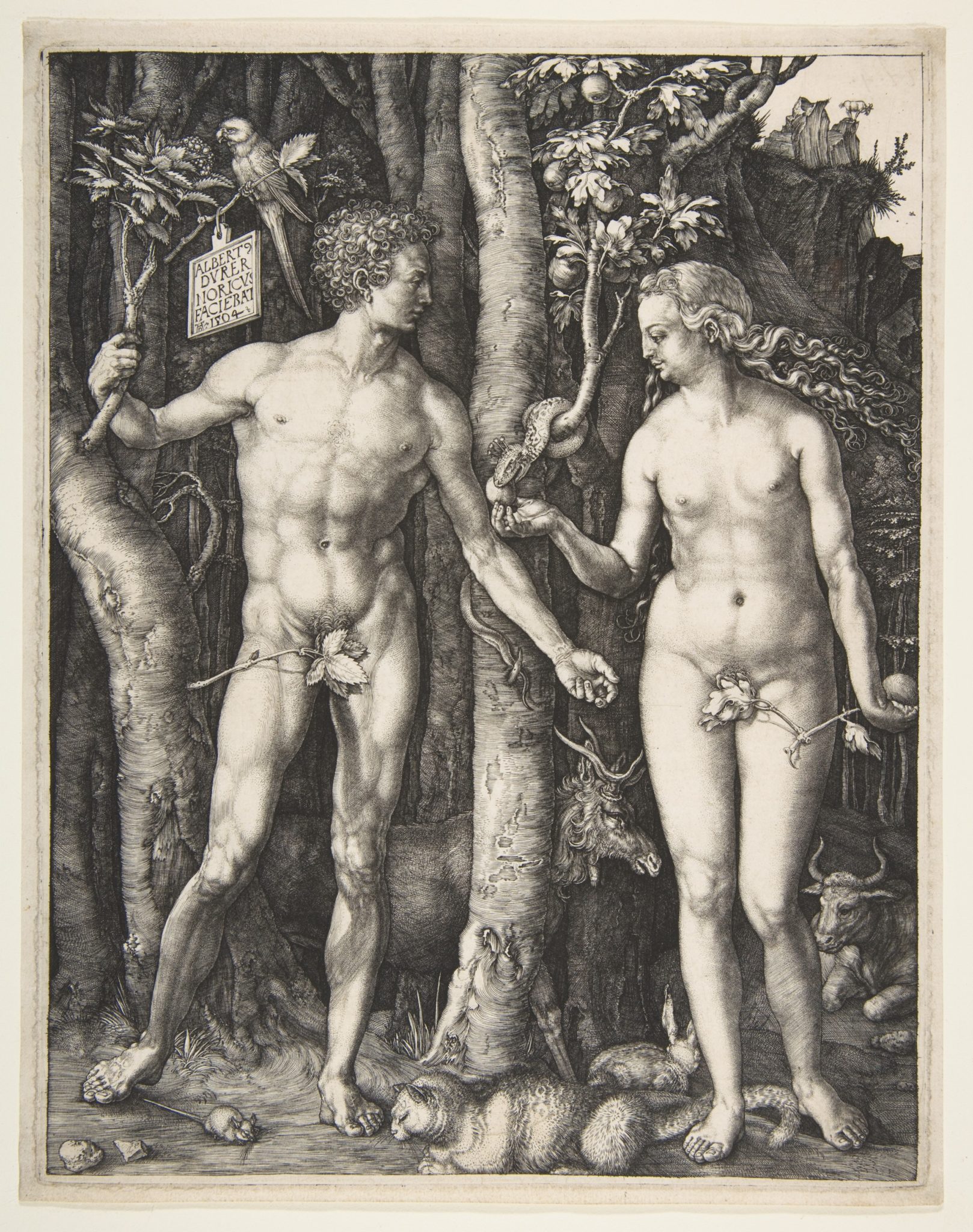
Adam & Eve – Albrecht Dürer – 1504
Courtesy of The Metropolitan Museum of Art
***
Heaven and Earth are the interlocking spheres of God’s single creation. They were both created equal. So why are they considered unequal now? Partially because we’ve swallowed the unbalanced dualism of teachers like Plato. There is, of course, more to be said about this.
But before I do that, I want to introduce a key element to the Theological engraving I’m etching out. I believe Classic Judaism & Christianity teaches us the presence of God makes all the difference in God’s creation. The presence of God is the great cosmic equalizer.
God’s presence is the supreme good from which all other goods derive.
But problems occur when God withdraws His presence. Or to put it another way, when we are exiled from God’s presence. Yes, the world is charged with the grandeur of God. Except when it isn’t. Divine presence becomes divine absence if the creational dwelling place is not fit for divine habitation. (This brings up the biblical theme of holiness, or consecration, a vitally important theme we must reserve for another time.)
Where does God take up residence now? For the most part in the created dimension called Heaven. So that makes Heaven superior to Earth, right? For now, yes. Inherently? Forever? No. Our story reveals God’s long term desire to cover the earth with His glory (presence) as the waters cover the sea.9Habakkuk 2:14 (NRSV): But the earth will be filled with the knowledge of the glory of the Lord, as the waters cover the sea.
And to sum up all things, both in heaven and earth, in Christ. Here are two important scriptures which speak about that desire of God.
Ephesians 1:8–10 (NRSV): With all wisdom and insight he has made known to us the mystery of his will, according to his good pleasure that he set forth in Christ, as a plan for the fullness of time, to gather up all things in him, things in heaven and things on earth.
1 Corinthians 15:24–28 (NRSV): Then comes the end, when he [Christ] hands over the kingdom to God the Father, after he has destroyed every ruler and every authority and power. For he must reign until he has put all his enemies under his feet. The last enemy to be destroyed is death. For “God has put all things in subjection under his [Christ’s] feet.” But when it says, “All things are put in subjection,” it is plain that this does not include the one [Father] who put all things in subjection under him. When all things are subjected to him, then the Son himself will also be subjected to the one who put all things in subjection under him, so that God may be all in all.
Let me be clear about something. I’ve written so much about bi-natured reconciliation and wholeness that I don’t want to be misunderstood. “Gathering up all things in Christ” and then saying God will “be all in all” is not Pantheism. I respectfully criticized the great religions of the Far East, Buddhism and Hinduism, in previous posts, but let me be very clear here. According to the Jewish – Christian Story, God existed before creating heaven and earth. Therefore Creation is valued. But Creation is not Divine. Creation is not part of God. According to the story we have received, creation is designed to be filled or covered with God’s gracious presence. As humans, that indwelling is our destiny. If we accept it. The filling doesn’t happen automatically. Also, tragically God’s presence may come and go. Our Divine Lover will not coerce a receptive response.
No. God is not in everything (Pantheism). Nor is everything in God (Panentheism). Christianity teaches Eschatological Theon-panism.10Sorry for this ugly phrase, but I can’t think of a better one.
God will be all-in-all. At the end, at the fullness of time, the fullness of God’s presence will flood the entire creation. Fill what can be filled and cover the rest. But not yet. There is still much work to do. We are encouraged by the knowledge that although God is separate from creation, God values and loves creation.
God breathed life into every living thing, but that life force, which humans call our soul, eventually leaves the body. This departure, this death, is not a graduation as Socrates (or Buddha) thought. It is a rupture that needs healing. This repairing will be ours when God’s Spirit animates the New Creation body we’ve been promised.11Romans 8:22–23 (NRSV): We know that the whole creation has been groaning in labor pains until now; and not only the creation, but we ourselves, who have the first fruits of the Spirit, groan inwardly while we wait for adoption, the redemption of our bodies. At the final resurrection our “naked” souls will marry new bodies. For we are not fully human until we get our bodies back. Plus God’s whole creation will be reconciled, renewed. Which means a renewed creation, renewed humanity, not heaven, is the Christian Hope.
But until the “fullness of time” arrives, please consider the following Scriptural catalogue about God’s desire to dwell with His people. (I apologize for the length. I wanted to be comprehensive, although I could have easily tripled the number of verses. If you want, just scan the highlighted words for flavor.)
So what does all of this have to do with the reconciliation of God’s creational pairs, in particular, men & women? Living a repaired Life won’t happen without Divine Presence.
We can’t begin to understand the Scriptures and God’s plan for us and the rest of creation without grasping the importance of Divine Presence.
Our catalogue begins in Eden where Adam & Eve heard the familiar sound of God walking in the garden to meet with them but this time after the great disobedience:
Genesis 3:8 (NRSV): They heard the sound of the Lord God walking in the garden at the time of the evening breeze, and the man and his wife hid themselves from the presence of the Lord God among the trees of the garden.
Fast forward to another early Biblical character Enoch:
Genesis 5:24 (NRSV): Enoch walked with God; then he was no more, because God took him. (Apparently after walking with God on Earth, Enoch never died.)
And now many years later but prior to the great flood:
Genesis 6:9 (NRSV): Noah was a righteous man, blameless in his generation; Noah walked with God.
Later in the story, God carries on a conversation with Noah and his sons (not a dream or prophetic vision but a community event, if you believe the story.)
Genesis 9:8–10 (NRSV): Then God said to Noah and to his sons with him, “As for me, I am establishing my covenant with you and your descendants after you, and with every living creature that is with you, the birds, the domestic animals, and every animal of the earth with you, as many as came out of the ark.”
Later Abraham walks & talks with God:
Genesis 17:1–5 (NRSV): When Abram was ninety-nine years old, the Lord appeared to Abram, and said to him, “I am God Almighty; walk before me, and be blameless. And I will make my covenant between me and you, and will make you exceedingly numerous.” Then Abram fell on his face; and God said to him, “As for me, this is my covenant with you: You shall be the ancestor of a multitude of nations. No longer shall your name be Abram, but your name shall be Abraham; for I have made you the ancestor of a multitude of nations.”
Genesis 17:15–17 (NRSV): God said to Abraham, “As for Sarai your wife, you shall not call her Sarai, but Sarah shall be her name. I will bless her, and moreover I will give you a son by her. I will bless her, and she shall give rise to nations; kings of peoples shall come from her.” Then Abraham fell on his face and laughed, and said to himself, “Can a child be born to a man who is a hundred years old? Can Sarah, who is ninety years old, bear a child?” And Abraham said to God, “O that Ishmael (first son by his servant Hagar) might live in your sight!” God said, “No, but your wife Sarah shall bear you a son, and you shall name him Isaac….my covenant I will establish with Isaac, whom Sarah shall bear to you at this season next year.” And when he had finished talking with him, God went up from Abraham.
Again, like those who went before, Yahweh12YHWH, the sacred name of God given to Moses at the burning bush.appears to our Faith-father & mother, Abraham and Sarah. This time outside his tent in the shade of an oak tree at a place called Mamre, a place where he had earlier built an altar and made sacrifices to this God. NOTE: Because I think we’ve become desensitized to the word “Lord” from this point forward I’ve kept the Hebrew “Yahweh (YHWH)” each time the text is translated “Lord” in English. I want you to understand the full impact of each encounter in space & time with God Almighty. Of course, you won’t get the full impact unless you believe these stories are true!
Genesis 18:1–15 (NRSV): Yahweh appeared to Abraham by the oaks of Mamre, as he sat at the entrance of his tent in the heat of the day. He looked up and saw three men standing near him. When he saw them, he ran from the tent entrance to meet them, and bowed down to the ground. He said, “My lord, if I find favor with you, do not pass by your servant. Let a little water be brought, and wash your feet, and rest yourselves under the tree. Let me bring a little bread, that you may refresh yourselves, and after that you may pass on—since you have come to your servant.” So they said, “Do as you have said.” And Abraham hastened into the tent to Sarah, and said, “Make ready quickly three measures of choice flour, knead it, and make cakes.” Abraham ran to the herd, and took a calf, tender and good, and gave it to the servant, who hastened to prepare it. Then he took curds and milk and the calf that he had prepared, and set it before them; and he stood by them under the tree while they ate.
They said to him, “Where is your wife Sarah?” And he said, “There, in the tent.” Then one said, “I will surely return to you in due season, and your wife Sarah shall have a son.” And Sarah was listening at the tent entrance behind him. Now Abraham and Sarah were old, advanced in age; it had ceased to be with Sarah after the manner of women. So Sarah laughed to herself, saying, “After I have grown old, and my husband is old, shall I have pleasure?” Yahweh said to Abraham, “Why did Sarah laugh, and say, ‘Shall I indeed bear a child, now that I am old?’ Is anything too wonderful for Yahweh? At the set time I will return to you, in due season, and Sarah shall have a son.” But Sarah denied, saying, “I did not laugh”; for she was afraid. He said, “Oh yes, you did laugh.”
Many generations later after the Exodus from Egypt:
Exodus 25:8 (NRSV): And have them make me a sanctuary, so that I may dwell among them. [Like God did by the altar under the oak tree at Mamre? Yes & no.]
Here are a few more verses that speak of other visible signs of God’s presence, usually in the form of a glory cloud or fire.
Exodus 29:42–46 (NRSV): (God speaking)…at the entrance of the tent of meeting before Yahweh, where I will meet with you, to speak to you there. I will meet with the Israelites there, and it shall be sanctified by my glory; I will consecrate the tent of meeting and the altar; Aaron also and his sons I will consecrate, to serve me as priests. I will dwell among the Israelites, and I will be their God. And they shall know that I am Yahweh their God, who brought them out of the land of Egypt that I might dwell among them; I am Yahweh their God.
Exodus 40:34–38 (NRSV): Then the cloud covered the tent of meeting, and the glory of Yahweh filled the tabernacle. Moses was not able to enter the tent of meeting because the cloud settled upon it, and the glory of Yahweh filled the tabernacle. Whenever the cloud was taken up from the tabernacle, the Israelites would set out on each stage of their journey; but if the cloud was not taken up, then they did not set out until the day that it was taken up. For the cloud of Yahweh was on the tabernacle by day, and fire was in the cloud by night, before the eyes of all the house of Israel at each stage of their journey.
Lev. 26:11-13 (NRSV): I will place my dwelling in your midst, and I shall not abhor you. And I will walk among you, and will be your God, and you shall be my people. I am Yahweh your God who brought you out of the land of Egypt, to be their slaves no more; I have broken the bars of your yoke and made you walk erect.
Numbers 35:34 (NRSV): You shall not defile the land in which you live, in which I also dwell; for I Yahweh dwell among the Israelites.
1 Kings 6:11–13 (NRSV): Now the word of Yahweh came to Solomon, “Concerning this house that you are building, if you will walk in my statutes, obey my ordinances, and keep all my commandments by walking in them, then I will establish my promise with you, which I made to your father David. I will dwell among the children of Israel, and will not forsake my people Israel.”
2 Chronicles 7:1–3 (NRSV): When Solomon had ended his prayer, fire came down from heaven and consumed the burnt offering and the sacrifices; and the glory of Yahweh filled the temple. The priests could not enter the house of Yahweh, because the glory of Yahweh filled Yahweh’s house. When all the people of Israel saw the fire come down and the glory of Yahweh on the temple, they bowed down on the pavement with their faces to the ground, and worshiped and gave thanks to Yahweh, saying,
“For he is good,
for his steadfast love endures forever.”
Psalm 78:58–60 (NRSV): For they provoked him to anger with their high places;
they moved him to jealousy with their idols.
When God heard, he was full of wrath,
and he utterly rejected Israel.
He abandoned his dwelling at Shiloh,
the tent where he dwelt among mortals, (remember this word ‘mortals’ it comes up later)
Isaiah 6:1–8 (NRSV): In the year that King Uzziah died, I saw Yahweh sitting on a throne, high and lofty; and the hem of his robe filled the temple. Seraphs were in attendance above him; each had six wings: with two they covered their faces, and with two they covered their feet, and with two they flew. And one called to another and said:
“Holy, holy, holy is Yahweh of hosts;
the whole earth is full of his glory.”
The pivots on the thresholds shook at the voices of those who called, and the house filled with smoke. And I said: “Woe is me! I am lost, for I am a man of unclean lips, and I live among a people of unclean lips; yet my eyes have seen the King, the Lord of hosts!”
Then one of the seraphs flew to me, holding a live coal that had been taken from the altar with a pair of tongs. The seraph touched my mouth with it and said: “Now that this has touched your lips, your guilt has departed and your sin is blotted out.” Then I heard the voice of the Lord saying, “Whom shall I send, and who will go for us?” And I said, “Here am I; send me!”
Isaiah 57:15 (NRSV): For thus says the high and lofty one
who inhabits eternity, whose name is Holy:
I dwell in the high and holy place,
and also with those who are contrite and humble in spirit,
Ezekiel 37:26–28 (NRSV): I will make a covenant of peace with them; it shall be an everlasting covenant with them; and I will bless them and multiply them, and will set my sanctuary among them forevermore. My dwelling place shall be with them; and I will be their God, and they shall be my people. Then the nations shall know that I the Lord sanctify Israel, when my sanctuary is among them forevermore.
Zechariah 8:3 (NRSV): Thus says Yahweh: I will return to Zion, and will dwell in the midst of Jerusalem; Jerusalem shall be called the faithful city, and the mountain of Yahweh of hosts shall be called the holy mountain.
And now some New Testament texts about God’s Presence. Take note of the “tabernacle” and “temple” language in all that follows.
Matthew 1:23 (NRSV): Look, the virgin shall conceive and bear a son,
and they shall name him Emmanuel,”
which means, “God is with us.”
John 1:1–2, John 1:14 (NRSV): In the beginning was the Word, and the Word was with God, and the Word was God. He was in the beginning with God….And the Word became flesh and lived (tabernacled, dwelled) among us, and we have seen his glory, the glory as of a father’s only son, full of grace and truth.
Here Jesus self identifies as the Temple.
John 2:19–21 (NRSV): Jesus answered them, “Destroy this temple, and in three days I will raise it up.” The Jews then said, “This temple has been under construction for forty-six years, and will you raise it up in three days?” But he was speaking of the temple of his body.
John 14:6–11 (NRSV): Jesus said to him, “I am the way, and the truth, and the life. No one comes to the Father except through me. If you know me, you will know my Father also. From now on you do know him and have seen him.”
Philip said to him, “Lord, show us the Father, and we will be satisfied.” Jesus said to him, “Have I been with you all this time, Philip, and you still do not know me? Whoever has seen me has seen the Father. How can you say, ‘Show us the Father’? Do you not believe that I am in the Father and the Father is in me? The words that I say to you I do not speak on my own; but the Father who dwells in me does his works. Believe me that I am in the Father and the Father is in me;
Finally, Jesus’s Church, known as his body, is the Temple where God dwells now.
1 Corinthians 3:16–17 (NRSV): Do you not know that you are God’s temple and that God’s Spirit dwells in you? If anyone destroys God’s temple, God will destroy that person. For God’s temple is holy, and you are that temple.
2 Corinthians 6:16–18 (NRSV): For we are the temple of the living God; as God said,
“I will live in them and walk among them,
and I will be their God,
and they shall be my people.
Therefore come out from them,
and be separate from them, says the Lord,
and touch nothing unclean;
then I will welcome you,
and I will be your father,
and you shall be my sons and daughters,
says the Lord Almighty.”
Ephesians 2:19–22 (NRSV): So then you are no longer strangers and aliens, but you are citizens with the saints and also members of the household of God, built upon the foundation of the apostles and prophets, with Christ Jesus himself as the cornerstone. In him the whole structure is joined together and grows into a holy temple in the Lord; in whom you also are built together spiritually into a dwelling place for God.
Sorry about all the verses (many more out there). But I wanted to impress upon you this vital Biblical theme of God’s Presence. God’s desire to appear, to dwell with us in a concrete, tangible way.
For those who tend to over-spiritualize these New Testament texts about “tabernacles” “temples,” “households,” and “buildings,” I would caution that these scriptures clearly indicate a physical structure within which the presence (spirit) of God dwells even though that “structure” in the New Testament takes the form of the human bodies of Jesus and his followers. What I’m saying is these New Testament metaphors have concrete referents, in this case human bodies, that can touch and be touched, both those of individuals and the gathered community. God is still choosing to dwell in physical “structures.” Disembodiment is not part of the divine plan! Here is clear evidence that God does not tell our bodies to go away. But, yet again, comes to us. Dwells in us.
***
Speaking now of the final consummation of all things, the remarriage of Heaven & Earth, the heavenly city, the New Jerusalem, that is crucially “coming down out of Heaven from God, prepared as a bride adorned for her husband” we find in the center of that city the Garden of God with the Tree of Life and the River of Life. Here at the end of the story we have finally returned to God’s Garden. Where God again dwells and presumably walks & talks with His people.
Revelation 21:3–7 (NRSV): And I heard a loud voice from the throne saying,
“See, the home of God is among mortals.
He will dwell with them as their God;
they will be his peoples, and God himself will be with them;
he will wipe every tear from their eyes.
Death will be no more;
mourning and crying and pain will be no more,
for the first things have passed away.”
And the one who was seated on the throne said, “See, I am making all things new.” Also he said, “Write this, for these words are trustworthy and true.” Then he said to me, “It is done! I am the Alpha and the Omega, the beginning and the end. To the thirsty I will give water as a gift from the spring of the water of life. Those who conquer will inherit these things, and I will be their God and they will be my children.
Revelation 21:22–24 (NRSV): I saw no temple in the city, for its temple is the Lord God the Almighty and the Lamb. And the city has no need of sun or moon to shine on it, for the glory of God is its light, and its lamp is the Lamb. The nations will walk by its light, and the kings of the earth will bring their glory into it.
Revelation 22:1–5 (NRSV): Then the angel showed me the river of the water of life, bright as crystal, flowing from the throne of God and of the Lamb through the middle of the street of the city. On either side of the river is the tree of life with its twelve kinds of fruit, producing its fruit each month; and the leaves of the tree are for the healing of the nations. Nothing accursed will be found there any more. But the throne of God and of the Lamb will be in it, and his servants will worship him; they will see his face, and his name will be on their foreheads. And there will be no more night; they need no light of lamp or sun, for the Lord God will be their light, and they will reign forever and ever.
Jewish temple theology, (that Christians don’t spend enough time on) and the temple’s central feature as God’s dwelling place, was even more important than Jewish views about Messiah OR Atonement for sins. God being present with His people was the paramount concern & expectation. Messianic hopes were centered on freeing the holy land & it’s people from oppression, and bringing them home from exile, for the purpose of recovering Divine Presence.
***
It is the presence of God that turns creation into paradise. Wherever we find God, whether heaven or earth, we find the paradise of Life.
God’s presence is the supreme good (summum bonum) from which all other goods derive.
Today you will be with Me in paradise Jesus told the brigand on the cross. The word paradise (gr. paradeisos) is a loanword from ancient Persia which can mean “an enclosed space,” “park,” or “garden.” In Scripture it is associated with Eden, Heaven, New Jerusalem, and Christ’s dwelling place (“Today, you will be with me in paradise”).
Creation was designed to be a receptacle of God’s presence. So we should make a distinction between God’s creation of temporary mortal life and God’s personal presence from which we receive everlasting life.
1 Corinthians 15:45 (NRSV): Thus it is written, “The first man, Adam, became a living being”(psyche); the last Adam [Christ] became a life-giving spirit (pneuma).
And like I’ve already written, the biblical witness is clear, the presence we yearn for, which is our highest good, without which we are powerless against illness, injury, decay and death, that presence is not automatically conferred, and tragically may be withdrawn.
And was.
This distinction accounts for the serpent’s half-truth. The disobedient couple would not die immediately, but by being cut off from the Tree of Life in God’s garden, God’s dwelling place, they would die eventually.
Genesis 3:4–5 (NRSV): But the serpent said to the woman, “You will not die; for God knows that when you eat of it your eyes will be opened, and you will be like God, knowing good and evil.”
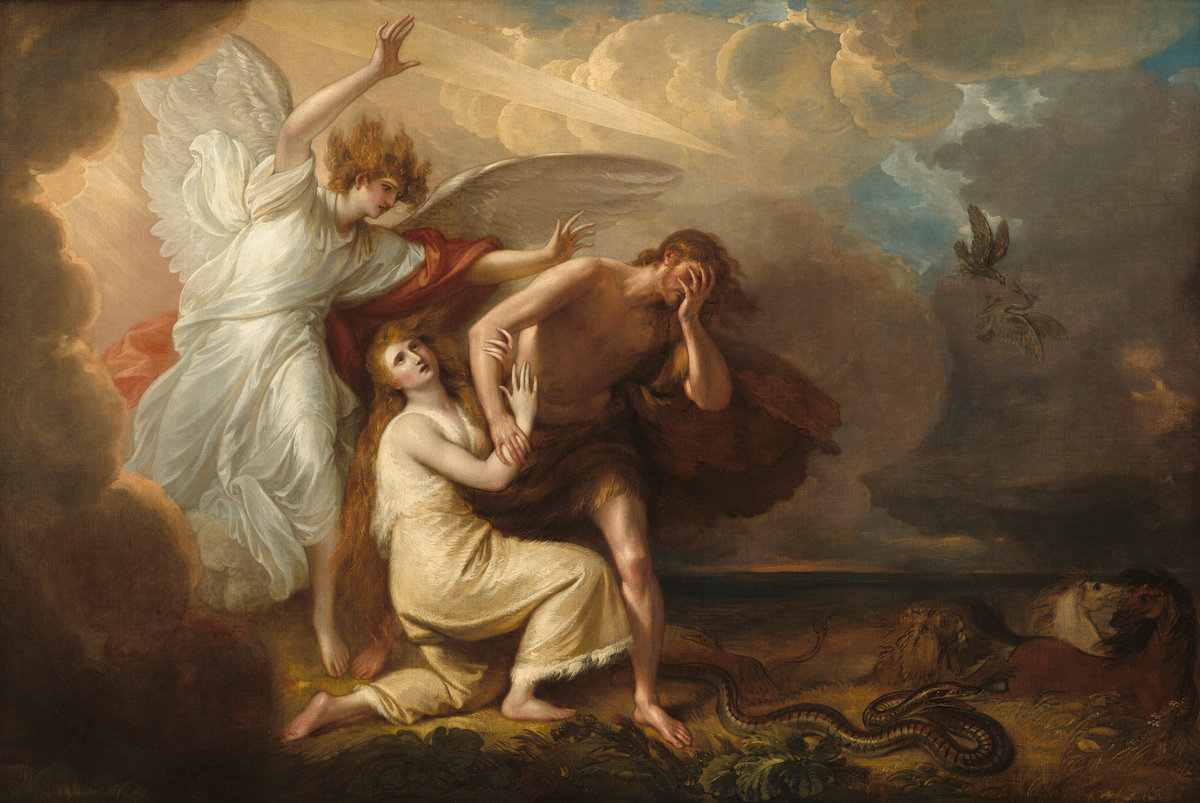
The Expulsion of Adam and Eve from Paradise – Benjamin West – 1791
Courtesy of The Metropolitan Museum of Art
***
God’s transcendence is not remoteness or aloofness but is known through his presence in his created world and temple. Divine transcendence and immanence are always held in balance in biblical theism. But the way I understand God’s bi-natured world leads me to the conclusion that Heaven (God’s space for now) and Earth (Human space) are not far apart and will finally be joined, like husband and wife, when all is “said and done.” The biblical witness leaves little doubt that God repeatedly is pleased to make Himself known to His people and be present with His people in tangible, physically recognizable ways. The Father most particularly demonstrated this good pleasure by sending His Son to dwell in this world & by His sacrificial death redeem this world & by His bodily resurrection recover, save this world. The sweeping narrative of Scripture teaches us God is going to do for the whole cosmos what he did for Jesus at Easter. No life-giving part of God’s creation will ever be told to go away.
***
Unfortunately much biblical scholarship in the last few hundred years has been wedded to the anti-supernatural bias of Enlightenment Rationalism and has reimagined the “Easter event.”13Thankfully, in the last several decades Biblical Scholarship has regained its nerve. For example, arguably the most influential New Testament scholar in the middle of the 20 century, bible scholar Rudolph Bultmann famously wrote:
“It is impossible to use electric light and the wireless and to avail ourselves of modern medical and surgical discoveries, and at the same time to believe in the New Testament world of spirits and miracles.”
For Bultmann, Easter morning brought “the rise of Christian Faith.” Nothing miraculous happened to Jesus’ body. The resurrection was a ‘spiritual‘ not a bodily matter. According to this influential bible scholar the rest of the gospel accounts having to do with spirits and miracles were just pious fictions. Why? Simply because he didn’t think miracles were possible.
I reject Bultmann’s anti-supernatural bias. And his rejection of Christ’s body.
Also, I’m convinced Bultmann falls into a similar trap that Plato fell into. (Plato did believe in the supernatural realm.). A trap that I call the abstraction heresy. Similar to an ancient heresy called Gnosticism (circa 150-300 AD) (Please pardon the following pun) Gnosticism is the idea that ideas matter more than matter. Way more! To the Gnostic, both ancient and contemporary, true spirituality is non-physical, non-material. The gnostic tendency when faced with a text that includes a miraculous element is to over-spiritualize the story by setting aside the physical aspect, like blind eyes healed, or dead bodies raised, and instead focus on the ‘spiritual’ truth at the heart of the story. The Gnostic understands the ‘miraculous’ event in question as something that happens in the hearts and minds of religious observers and not as a concrete occurrence in space & time. This is a very anti-Jewish reading, by the way. For the Gnostic, healings of the body, calming of the storms, raisings of the dead, and a God who walks and talks among us are just pious fictions. Gnostic readers fear, above all else, religious over-earthiness. But for Classic Christianity, God’s method of revelation, encounter & recovery is the other way around, the Word became flesh and dwelled among us.
God made concrete. He literally poured the foundations of the earth (I’m speaking metaphorically. But the metaphor has a concrete referent 😇). Concreteness is not inferior to abstraction. Matter is God-created and may be God-bearing. Visible is not inferior to invisible, once it has been cleansed (again the vitally important topic of holiness or consecration that we should explore later.)
GNOSTICISM: the Gnostics taught a bewildering variety of views. Fundamental to clearly gnostic systems was a dualism, which opposed the transcendent God and an ignorant demiurge (often a caricature of the OT Jehovah). In some systems the creation of the world resulted from the presumption of Sophia (Wisdom). In any event the material creation, including the body, was regarded as inherently evil. Sparks of divinity, however, had been encapsuled in the bodies of certain pneumatic or spiritual individuals, who were ignorant of their celestial origins. The transcendent God sent down a redeemer (Christ), who brought them salvation in the form of a secret gnōsis or “knowledge.” Most Gnostics were docetics, who held that Christ did not really suffer as he was not truly incarnate. Gnostics hoped to escape from the prison of their bodies at death and to traverse the planetary spheres of hostile demons to be reunited with God. There was for them, of course, no reason to believe in the resurrection of the body. – (Dictionary of Paul & His Letters, InterVarsity Press, 1993, pg 352,)
A little more about Gnosticism. This is important. As just mentioned sometimes in Gnostic belief a redeemer-figure comes down to the world of humans, but only in order to return from that wicked sphere to his own true home. Usually this figure reveals to a special group the secret knowledge of who he is and thus who they are. And because of this revealed knowledge or “gnosis” they come to realize they possess an “inner spark” or “divine light.” According to the Gnostic Redeemer all humans possess this divine spark but the vast majority never acquire this knowledge and so remain in darkness. Usually assertions are made that the true human self is naturally divine but imprisoned or trapped by the material world. At which point the redeemer-figure re-ascends to lead the way back to the disembodied world of light. You can find Plato’s inspiration in these teachings, and unknowingly for the Gnostics, similarities with Buddha as well. But not Jesus. Unless you wildly distort (“reimagine”) the God, and the recovery plan, depicted in Matthew, Mark, Luke & John or the early Apostles and their Scriptures (the Old Testament).
Gnosticism is an old and contemporary anti-creational error.
Any belief system, any worldview that discounts the God-givenness of the body and by extension devalues the material world around us and proceeds to teach that only our enlightened mind, soul, spirit or “inner light” are important has fallen prey to the anti-creational doctrines of Gnosticism. And has in effect told one part of God’s bi-natured creation to go away.
Classic Christianity teaches that God the Father, and God the Spirit, exist as pure Spirit. But not God the Son! Hear the words of Jesus: “But the hour is coming, and is now here, when the true worshipers will worship the Father in spirit and truth, for the Father seeks such as these to worship him. God is spirit, and those who worship him must worship in spirit and truth.”14John 4:23–24 (NRSV)
So my question about Gnosticism, Platonism, or any other Escapist Theology is this:
Isn’t the desire to leave our bodies behind and become a “pure Spirit” similar to the desire that possessed Adam & Eve? Eat this forbidden fruit, they were told, and you will become “like God.” The Gnostic wants to become a being like God. In other words, a pure Spirit.
But this was not given to us by God. God gave us bodies to be sanctuaries, temples for our spirits. And God’s Spirit.
You won’t find one scripture suggesting our goal is to become “a disembodied spirit.” I just reviewed every occurrence of the words “soul” “spirit” “spirits” or “Spirit” in the New Testament and not once does any passage (over 350 of them) suggest that becoming a disembodied spirit is the believers destiny. You won’t find one. We bring that idea to the text.
I believe as creatures we should want to become what we were created to be. Nothing more, nothing less.
God didn’t blunder when we were given bodies. The Gnostics and Plato are grasping for something that God did not give us. Is this not like the original couple who grasped for the knowledge they were told would make them like God? I think it is. We were created as embodied souls. That’s what it means to be human and humans we will remain.
The Gnostic story line, Bultmann’s story line, Plato’s story line, Buddha’s story line, I wholeheartedly reject. There is a higher, more inclusive spirituality than theirs. A spirituality which affirms all parts of God’s good creation as non-dispensable.
***
A more inclusive Christian spirituality has Spirit and Matter coming together in unity yet without subsuming the distinctiveness or importance of either. That union is the necessary building block for creational life. When a cleansed Soul & Body is combined with Divine Presence this union produces the Life our good, but dying world needs. What does that look like? Love in action. God’s abiding presence at the center is not just a good idea or personal experience, it is visible, identifiable, shareable. For this spirituality produces meat on the bones and boots on the ground. Calls for insularity or private spirituality must go unheeded. Our job is to spread the garden to the desert wilderness and to invite the inhabitants of the dry and dusty places to join us as we eat from the tree of life & drink the water of life together. Liberty is, of course, respected. And so our presentation of the presence is always invitational, never coercive. You don’t coerce image bearers, you invite them to “come and see” and then “eat and drink.” So that they might join us in the pursuit of creational presence. And it must be pursued holistically.
2 Corinthians 7:1 (NRSV): Since we have these promises, beloved, let us cleanse ourselves from every defilement of body and of spirit, making holiness perfect in the fear of God. [Note how both visible & invisible need cleansing.]
Hebrews 12:14 (NRSV): “Pursue peace (reconciliation) with everyone, (Jew & Gentile, male and female, rich and poor) and the holiness without which no one will see the Lord.”
The concrete, visible world was not a creational mistake. That’s Plato talking, Gnosticism talking, not the God of Abraham, Isaac, and Jacob talking, not the God who made himself known in the burning bush, an unconsumable bush because God took up residence there, or in the glory cloud on the mountain top with Moses or in the Tabernacle & Temple, or the pillar of cloud by day and the pillar of fire by night, and most certainly not the God who became flesh and “tabernacled” among us. Who worked the work, talked the talk and walked the walk He did. Nor the Lord God who died for His servants and was raised bodily to newness of life. And who ascended to Heaven to take His Royal place on the shared Throne, the shared Throne! at the right hand of God the Father Almighty outfitted for all time with a human body. A human body! [The Classic Christian doctrine of Ascension]
Oh, the depth, the wisdom, the riches of the love of God!
The God of creational presence and marriage is the Christian God. A God who will not tell any life giving part of His creation to go away. Ever. Death, and everything that leads to death, will, of course be banished forever.
This is the “scandal of particularity” from which the biblical witness will not let us escape. The omnipresent Living God takes up residence in the center of His people. This God who is everywhere designates times and places to powerfully appear, guide and cleanse His people through the washing of the water of His Word and by the energizing infusion of Divine Presence. Classic Judaic and Christian Faith does not operate with generalities and generic claims. The notion of concrete physical palpable Divine Presence at a specific time and place may sound crude and elemental to the Plato’s or Bultmann’s of this world but the God who created the Heavens and Earth doesn’t think or act so. This God acts in history and doesn’t simply reside in nature as a impersonal force or power.
It is the reconciling presence of this God that makes the difference in creation. God dwells primarily in heaven now but God’s intent from the beginning is to dwell at the intersection of both heaven & earth. In the overlapping Temple Garden with us. The garden of Eden in our past and the garden-city New Jerusalem in our future. A city which one day will appear out of Heaven to join Heaven with Earth forever.
It will be the trysting place of God with Humanity in the garden of God at the intersection of Heaven and Earth.
If all of this sounds slightly sexual then your getting the point. And we didn’t need the desiccated Freudianism of the 20 Century to see it. For where God’s Big Picture intent is realized—Life happens!
Marriage is the controlling image, the interpretive key for life, our life, the world’s life, Creation’s life, yesterday, today, and forever. The Big Picture presented in Scripture shows us the eternal plan of reconciliation. It reveals the harmonious coming together of difference in loving, life-creating community. Just like our Triune God. For God contains within the Trinity the actual experience of love because God constitutes a community of persons in pure reciprocity. A love filled—life creating—entanglement perfectly illustrated on earth by the original human pair. The two that became one that became three.15Matthew 19:3–6 (NRSV): Some Pharisees came to [Jesus], and to test him they asked, “Is it lawful for a man to divorce his wife for any cause?” He answered, “Have you not read that the one who made them at the beginning ‘made them male and female,’ and said, ‘For this reason a man shall leave his father and mother and be joined to his wife, and the two shall become one flesh’? So they are no longer two, but one flesh. Therefore what God has joined together, let no one separate.”
Do you see it?
So what happened to cause the unGodly separations that we find? The lack of reciprocal love? And the death which followed?
***
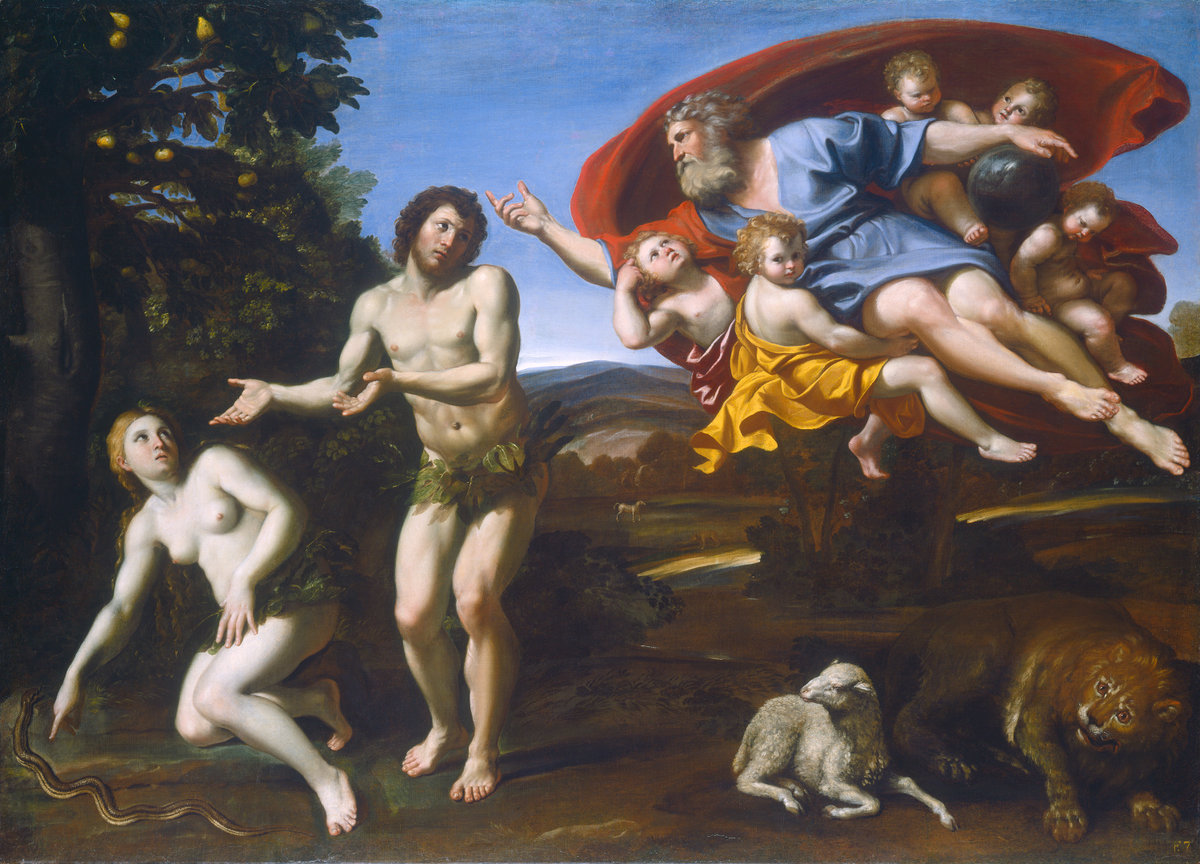
The Rebuke of Adam and Eve – Domenichino – 1626
Courtesy of The National Gallery of Art
***
In the early world of sin, a grasping world, a world of recrimination and blame shifting, “it was the woman You gave me, it was the serpent who tricked me!” A world where advantage was increasingly maximized for selfish gain instead of advantages being at the service of loving community, in that world, a cursed world of thorns and thistles and sweaty brows, a world where abundance could only be extracted through physical hardship, where eating occurs only after much toil, in that world, the male, the physically stronger, would rule. But at the beginning, before the curse, it was not so.
***
I know what I’m saying will probably not satisfy the concerns of some. I respect that. My reading of the text couldn’t possibly answer all our questions. There are puzzles to piece together here. But let me take my courage in both typing hands and offer the following interpretation of male and female relationships in the Kingdom of God as opposed to the kingdoms of man or woman. For the purpose of repairing the breach.
In finishing up this post and then moving to the next I’m going to look at the “two beginnings” of our story. The second builds on the first and yet reinterprets it in fresh and exciting ways. I call the second beginning the great reversal, part I. But as you might expect from me by now, not a reversal from the goodness of creation rather a reversal from the curse of creation. A crucial distinction.
First things first. Whether you take the story literally as most Christians have, or you understand the Creation Story more like True Myth, hopefully you will find this helpful. And see how the ancient Hebrew text soundly rebukes Socrates and his disciples. Here goes…
***
Man was alone from the standpoint of being without peer, without equal. And from the Christian point of view, as such, Man was unlike God in God’s fullness, that is to say God’s Triune nature, Father, Son, Spirit. For God was never alone in the same sense that Man was alone. Up to this point God created “good” things, but for the first time in the story God saw that something was “not good.” Man lacked a corresponding companion. So, before God pronounced Creation “very good,” God created an equal for Man.
Genesis 2:18–23 (NRSV): Then the Lord God said, “It is not good that the man should be alone; I will make him a helper as his partner.” So out of the ground the Lord God formed every animal of the field and every bird of the air, and brought them to the man to see what he would call them; and whatever the man called every living creature, that was its name. The man gave names to all cattle, and to the birds of the air, and to every animal of the field; but for the man there was not found a helper as his partner. So the Lord God caused a deep sleep to fall upon the man, and he slept; then he took one of his ribs and closed up its place with flesh. And the rib that the Lord God had taken from the man he made into a woman and brought her to the man. Then the man said,
“This at last is bone of my bones
and flesh of my flesh;
this one shall be called Woman,
for out of Man this one was taken.”
“Bone of my bone, flesh of my flesh” the Man exclaimed! And now, finally, an equal for him to cherish, like he would cherish his own body. So that together they might live in loving community, just like God. There is not a hint of inequality in this story. Both were created in God’s image16Genesis 1:27-31 (NRSV): So God created humankind in his image, in the image of God he created them; male and female he created them. and both charged to be God’s representatives, God’s wise stewards on and for the Earth.
A Word about Words.
Don’t be thrown off by the word “helper”. This does not mean “assistant” nor does it imply subordination.
In fact a close study of the Hebrew word translated “helper” shatters that mythical misunderstanding. I love what I found out about this word. The Hebrew word is [ʿēzer]. Look how it is used elsewhere in Scripture (these are just a few examples) Exodus 18:4 (NRSV): “The God of my father was my help, and delivered me from the sword of Pharaoh.” Deuteronomy 33:7 (NRSV): “O Lord, give heed to Judah, and bring him to his people; strengthen his hands for him, and be a help against his adversaries.”
Psalm 121:1–2 (NRSV): I lift up my eyes to the hills—
from where will my help come?
My help comes from the Lord,
who made heaven and earth.
The stronger is the “helper”, not the weaker! Can I get a witness, ladies!!?
The verb behind ʿēzer is ʿāzar, which means “succor,” “save from danger,” “deliver from death.” Since the man was in a pre-fallen state of innocence from what did he need deliverance? Solitude. The woman saved him from solitude and in so doing they together became more like the image and likeness of the Triune God. They became a loving community of equal persons. (I’m speaking as a Christian, of course.)
Nope. Nothing subordinate about “helper.”
One more word study based on the following text: “she shall be called ‘woman’ [ʾiššá] because she was taken from man [ʾîš].” One bible scholar put it this way: “The text does not say “she shall be called female [neqēḇá], for she was taken out of male [zāḵār].” Perhaps by using two words which sound alike the narrator wished to emphasize the identity and equality of this primal couple.”17The Book of Genesis, by Victor P. Hamilton, pg 180.
Sounds very good to me.
A Word about Sequence
Understandably Jewish Rabbis tried to answer the how and why questions after the Fall. Why was the woman deceived? Why did the deceiver approached her first? Several theories emerged. One was the argument from temporal priority. Men were regarded as superior by some Jewish Rabbis because man was created first. So the crafty serpent in a classic divide and conquer maneuver first approached the weaker woman.
But consider this. Is an adult son inferior, unequal to his father? A mature daughter to her mother? We don’t think that way do we? Why should we here? Christian theology may displace some discomfort with the creation story. Is the Son inferior or unequal to the Father? No. He isn’t.18Of course Christian Doctrine teaches there was no sequence in the Godhead, the Father, Son, and Spirit co-existed eternally but my point is about family relationship.
Think of it this way. If Eve had come out of the ground like Adam, separate from Adam, unrelated to Adam, instead of out of a fully formed Adam, then perhaps the sequence critique would have more bite. But instead, like children who come from the body of parents, woman comes from man, not the ground, yet, unlike children, she comes fully formed with the same vocational calling & ruling capacities as her fully formed husband. From the standpoint then of family relationship, there is not a hint of inequality or inferiority in the text. We bring those ideas to the text. At the most there may be a teacher – pupil relationship at the beginning since the man had “been there, done that” before the woman came along, but there is nothing inherently inferior in teaching relationships. We’ve all had the experience of the dedicated pupil eventually “outshining” the teacher. Happens all the time. Doesn’t it ladies? 😉 My wife could dance circles around some of the guys she worked with and from whom she previously learned. And it was a beautiful thing. Something to be celebrated and cherished. As any healthy team with a common goal would recognize.
Does all of this mean you can’t be a whole person, who fully reflects God without being husband and wife? No. Jesus never married. Neither did Paul. Nor many others. The point is God’s image is most fully on display when males and females in loving community reflect God’s image and likeness, God’s unity and plurality. And when that imaging of God is reflected out to the wide world around them. That’s what it means to be an image bearer. This is what holistic humanity looks like. Ruling and serving creation together. As Kings and Queens, or Vice-Regent Brothers & Sisters, or Male & Female Priests.
***
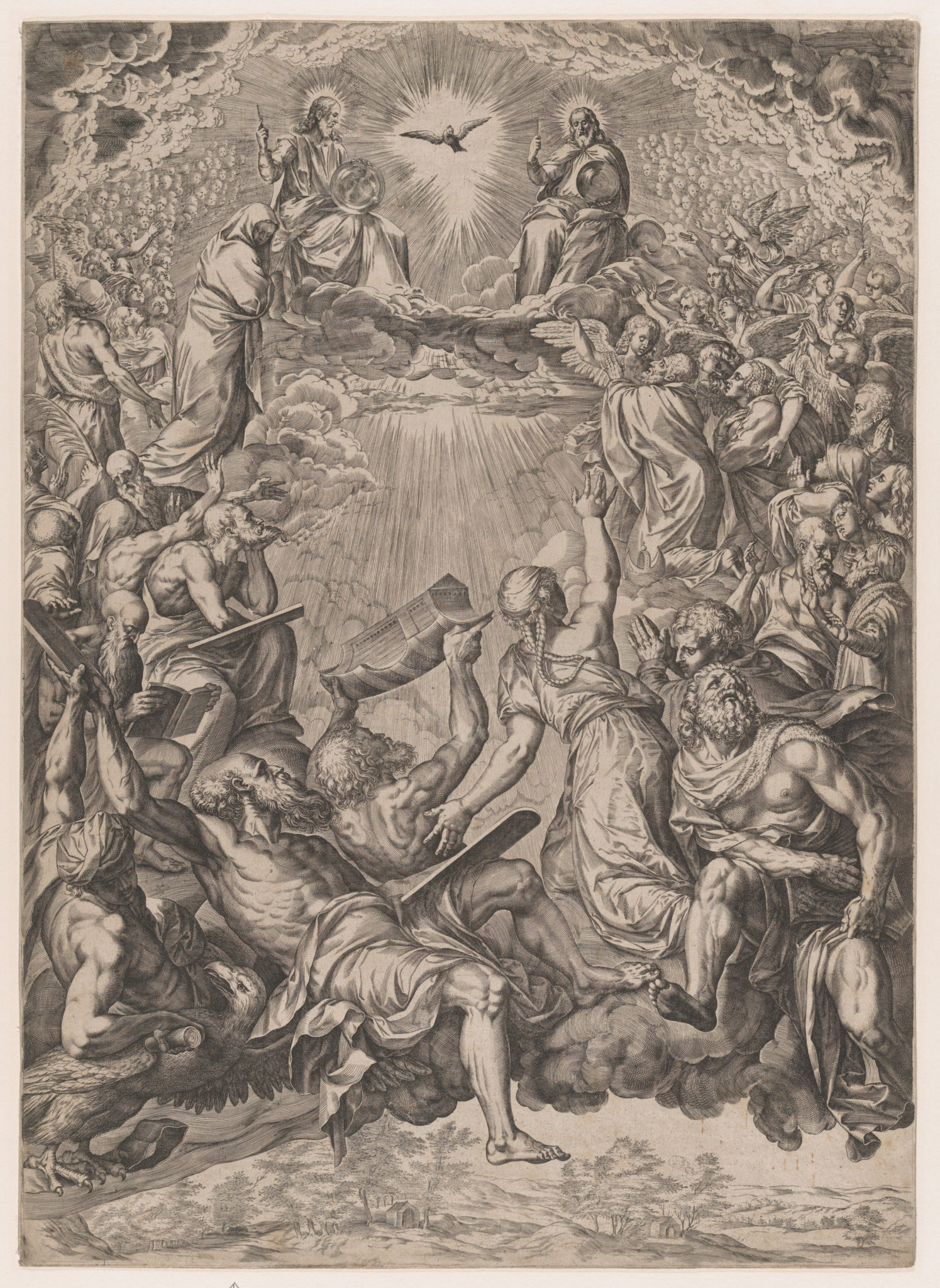
The Adoration of the Trinity – Cornelis Cort – 1566
Courtesy of The Metropolitan Museum of Art
***
Once again, if Christian teaching about the Trinity is true, as I believe it is, until the woman came along and delivered the lone man from solitude he alone was not fully the image and likeness of God. For God is a loving community of equal persons. It is male and female together that reflects the fullness of God in and for creation.
Let’s go deeper.
Matthew 18:19–20 (NRSV): Again, truly I tell you, if two of you agree on earth about anything you ask, it will be done for you by my Father in heaven. For where two or three are gathered in my name, I am there among them.”
United humanity, as male & female, reflects the unbroken image & likeness of God. And since Creator God is a life-giving God and the first humans were given a vocation, a job to perform, a job as image bearers to cultivate life and spread the garden of God throughout the whole creation, they were commanded to make babies. For where there are two or three!
Father, Mother, Child is the archetypal earthly image of the Triune God’s loving community.
It may sound shocking to prudish ears but the first commandment recorded in scripture was to have sex! And make babies.
Genesis 1:27-31 (NRSV): So God created humankind in his image,
in the image of God he created them;
male and female he created them.
God blessed them, and God said to them, “Be fruitful and multiply, and fill the earth and subdue it; and have dominion over the fish of the sea and over the birds of the air and over every living thing that moves upon the earth.” God said, “See, I have given you every plant yielding seed that is upon the face of all the earth, and every tree with seed in its fruit; you shall have them for food. And to every beast of the earth, and to every bird of the air, and to everything that creeps on the earth, everything that has the breath of life, I have given every green plant for food.” And it was so. God saw everything that he had made, and indeed, it was very good. And there was evening and there was morning, the sixth day.
This passage tells us what it means to be God’s image bearers, which I take to mean mostly, God’s representatives, God’s “angled mirrors” reflecting God’s Love, Personality & Creativity to the world, a world over which Humans would lovingly rule and serve as participants in God’s great creation project. Notice also this delegation of authority and dominion over the natural world does not include similar dominion over other humans or each other. Our model is loving, creative, Triune community.
***
If you contrast this vocational calling with the Egyptian & Mesopotamian beliefs about “image of God” you will find a vitally important difference. Once again, Bible scholar Victor Hamilton:
“It is well known that in both Egyptian and Mesopotamian society the king, or some high-ranking official, might be called “the image of God.” Such a designation, however, was not applied to the canal digger or to the mason who worked on a ziggurat. Gen. 1 may be using royal language to describe simply “man.” In God’s eyes all of mankind is royal. All of humanity is related to God, not just the king. Specifically, the Bible democratizes the royalistic and exclusivistic concepts of the nations that surrounded Israel.”
Again, that sounds VERY GOOD to me! Unlike Egypt & Babylon, two of the great civilizations of the ancient near-eastern world, civilizations built and sustained by systemic slavery, the ancient Hebrew story calls all humans Royal Image Bearers (RIBs). As royalty, humans should never be considered means to an end. All are created in the image of God. And as such are valued and called.
***
So what happened? An attempt was made to know good from evil independently of God in order to obtain equality with God. We had equality with one another but we wanted equality with God (a perennial problem). We became a grasping world, instead of a receiving world. Right relationship between creation and Creator was thereby breached. We are not given many details, but Exile, Inequality and Death followed. And all creation cursed. We know a lot about that. But by God’s Grace and Mercy, a plan for a great reversal & a New Beginning began weaving its way through history. But this plan would take time, because the Living God values Liberty. For without liberty, Love is impossible. How else can you explain the creation of a world that was allowed the freedom to go wrong? That God would not coerce a receptive response. He would require it, if we wanted a fruitful life. But “coerced love” is a contradiction. So the “fullness of time” would take time.
In my next post we’ll look at how the two bachelors I just mentioned, Jesus and Paul, work toward that goal of holistic humanity and creational marriage. In the second part of the “two beginnings” story.
***
But let me finish with this. Matthew Henry (1662–1714) the influential19Henry significantly influenced the ministries of John & Charles Wesley, and the Great Awakening’s George Whitfield Puritan bible scholar once commented:
Eve’s being made after Adam, and out of him, puts an honor upon that sex, as the glory of man. If man is the head, she is the crown.… The man was dust refined, but the woman was dust double-refined, one removed further from the earth. [She was] not made out of his head to rule over him, nor out of his feet to be trampled upon by him, but out of his side to be equal with him, under his arm to be protected, and near his heart to be beloved.
Husbands who abide close to the heart of God have always felt this way about their wives. I would certainly want to go further than Rev. Henry went when thinking of female roles within the church & larger society, but there is much to applaud in his 17th Century Christian wisdom.
Speaking of going further, I’m happy to report that my current pastor is female. Seminary trained to teach us the Word and by the grace of God’s presence fan into flame our particular callings, male and female. As it was in the beginning.
You go girl!

If you haven’t already added your email to my list, do so and I’ll let you know when the blog is updated.
Email: blog@blueridgemountain.life


